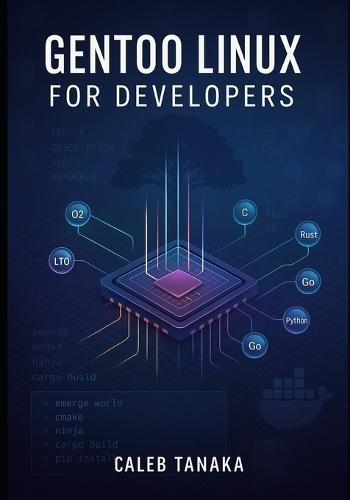Overview
Build a faster development workstation on Gentoo with precise control over Portage, compiler flags, and custom toolchains. Generic Linux setups hide how software is built, which slows compile and link cycles, bloats dependencies, and makes debugging harder. Developers need a workstation that is predictable under load, tuned for their CPU, and flexible across language stacks. This book shows how to plan, install, and maintain a Gentoo system that fits professional workflows. You will compile from source with intent, shape Portage policy for stability and speed, and apply data driven optimizations that shorten iteration time without sacrificing reliability. Plan a developer focused Gentoo layout, choose filesystems, and set tmpfs or disk strategies that accelerate builds Configure Portage cleanly with makeconf packageuse packageenv and per package environments for lto thinlto mold lld debug and sanitizers Use USE flags with discipline to reduce dependency sprawl while enabling exactly the features your projects require Tune compiler and linker flags including march mtune optimization levels frame pointers visibility and section based dead code removal Apply link time and profile guided optimization and verify gains with repeatable benchmarks and perf based profiling Speed up compilation with ccache distcc parallel jobs and load controls that keep the desktop responsive Build and switch multiple GCC Clang and LLVM versions and manage Rust Go Python and CC++ toolchains side by side Create cross compilation toolchains and consistent sysroots for embedded and multi architecture targets Configure kernels for development tasks enable debugging options and manage multiple kernels safely Set up editors IDEs version control build systems CICD hooks and container workflows with Docker and Podman Use overlays effectively track cutting edge tools without destabilizing the base and package local or internal software Maintain with a clear weekly update routine handle conflicts quickly rebuild preserved dependencies and keep binary packages for rollback Back up configuration and artifacts with snapshots binary packages and offsite archives and recover confidently with a chroot Contribute fixes upstream and improve docs so future updates are smoother for you and your team This is a code heavy guide with working Bash Python C CMake Rust TOML Dockerfile and configuration snippets that you can copy into real projects and adapt with minimal changes. Grab your copy today.
Full Product Details
Author: Caleb Tanaka
Publisher: Independently Published
Imprint: Independently Published
Dimensions:
Width: 17.80cm
, Height: 1.40cm
, Length: 25.40cm
Weight: 0.458kg
ISBN: 9798268872651
Pages: 260
Publication Date: 07 October 2025
Audience:
General/trade
,
General
Format: Paperback
Publisher's Status: Active
Availability: Available To Order

We have confirmation that this item is in stock with the supplier. It will be ordered in for you and dispatched immediately.



